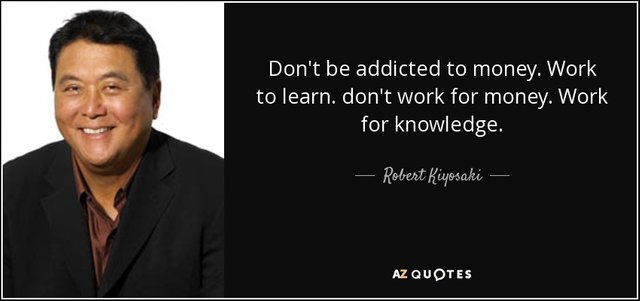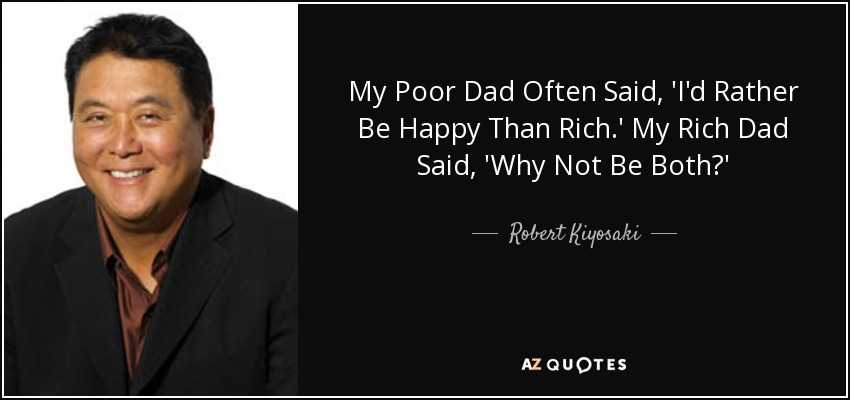
Chapter 4: The history of taxes and the power of corporations
Salaried people earn their salary, pay taxes and then spend from whatever amount is left. Rich people earn, their companies pay all their expenses including taxes and then they have enough amounts to spend, as all their expenses are paid before paying any tax.
Author advises to talk to businessmen and investment bankers to learn businesses. Reading and understanding of financial statements is a must to understand how a business operates. Rich dad’s lesson: how rich people protect themselves from heavy taxes? Their secret: Corporations!
Chapter 6: The Rich Invent Money
The author develops the concept of self-doubt. He says that each person is born with talent but that talent is suppressed because of self-doubt and fear. He remarks that it’s not necessarily the educated smart people who get ahead but the bold and adventurous. People never get ahead financially even if they have plenty of money because they have opportunities that they fail to tap, he stresses. Most of them just sit around waiting for opportunity to happen. The author’s idea is that people create luck; they should not wait around for it. He says it’s the same with money. It has to be created.
In this chapter, the author discusses the importance of an education (although some critics say that he appears to downplay its importance). The author is clear by saying, “a trained mind is a rich mind.” In his analysis, there are two types of investors, each with a different mind set: those who go for the packaged investment, and those who customize investments to suit their objectives.
The author encourages people to hire people more intelligent than they because by capitalizing on the knowledge of others, an intelligent individual builds his own knowledge base and therefore has more power over those who don’t know.
Chapter 7: Work to Learn, Don’t Work for Money
his is the chapter where the author talks about the skills individuals need to develop for financial success.
The reader is given an example of a young woman who had a Master’s Degree in English Literature and who was offended when it was suggested that she learn to sell and do direct marketing. After all the hard work for her degree, she didn’t think she would have to stoop so low to learn how to be a salesperson, a profession she didn’t think very highly of. The author uses this example to emphasize that there are other skills people need to cultivate to help them on the road towards financial freedom.
The author mentions management skills. He says individuals need to know how to manage cash flow, systems, and people. To that he throws in selling and marketing skills. He puts equal emphasis on communication skills. He says there are many people who have the scientific bent and hence have a powerhouse of knowledge, but they fail miserably in communications. These are the people who are “one skill away from great wealth.”
The author calls attention to one outstanding trait of great wealthy families: they give money away – plenty of it – unlike the poor who feel that charity begins at home.

Chapter 7: Overcoming obstacles
This chapter starts with a bold claim: “the primary difference between a rich person and a poor person is how they manage fear”. Once people become financially educated, they still face some obstacles to become rich. In particular, Robert Kiyosaki enumerates 5 obstacles: 1) fear, 2) cynicism, 3) laziness, 4) bad habits and 5) arrogance. Robert Kiyosaki explores all these obstacles, one by one. Regarding fear, Kiyosaki says that everyone fears to lose money. Rich dad recommended Kiyosaki to think like a Texan when it comes to fearing losing money: they think big, and they’re proud when they win and brag when they lose. Rich dad also said that the greatest reason for lack of financial success was playing too safe. “People are so afraid of losing that they lose”, rich dad said. Kiyosaki leaves another bold claim: “for most people, the reason they don’t win financially is because the pain of losing money is far greater than the joy of being rich”. In essence, they play not to lose, not to win. Balanced portfolios are fine if you have to lose, but make sure you start early.
The second obstacle is cynicism. Kiyosaki uses the story of the Chicken Little to illustrate that we all have doubts, or noise, as Kiyosaki calls it. It can come from within or for the outside. A savvy investor has to know how to make money even in bad times. Kiyosaki tells the story of a friend who backed out on a deal Kiyosaki and his wife had arranged. Another example is tax-lien certificates, which Kiyosaki keeps a portion of his money in, and people often evaluate as “risky” even without investing in them. As rich dad said, “cynics never win”. They criticize, and winners analyze. At the end of this section, a motivational story is provided: Colonel Sanders lost his business at age 66 and started to live off a Social Security check. He went around the country and over more than a thousand rejections, he finally became a multi-millionaire, after selling his fried chicken recipe.
A “little greed” is the solution to laziness, the third obstacle. Although we are raised thinking of greed as bad, as Kiyosaki reports, that greed is what really makes us tend laziness off. Again, he relates this greed with the reactions of both dads to Kiyosaki’s asks, when he was younger. While the poor dad use to say “I can’t afford it”, rich dad use to say “how can I afford it?”, opening up possibilities and excitement. When Kiyosaki wanted to quick the rat race, he questioned himself and thought about how would his life be if he didn’t have to work again. Our lives are a reflection of our habits more than our education. An example of a good habit preached by the rich dad was to pay himself first, and bills last. This motivated him to deliver: if he could not pay his creditors, he was forced to find additional sources of income.
Arrogance is the last obstacle. Rich dad lost money whenever he was arrogant. People are arrogant to hide ignorance. If you’re arrogant in a subject, start educating yourself by finding an expert or reading a book.
Rich dad’s lesson – What to do? Action plan
• Assess your present situation: If you keep on doing what you are doing since quite some time, you will get the same results what you are getting. To get new results, do some thing different.
• Try to find some new idea – how will you create and income generating asset?
• Take action, after finding new some new idea. Practical tip: Find Mentor. Try to find some person who has achieved what you want to achieve. Ask tips from him / her.
• Try to invest in real estate when market is down. Make offers. Don’t sit and wait for opportunity to come.
• Learn from lessons of successful people.

Congratulations @programeek! You have completed some achievement on Steemit and have been rewarded with new badge(s) :
Click on any badge to view your own Board of Honor on SteemitBoard.
For more information about SteemitBoard, click here
If you no longer want to receive notifications, reply to this comment with the word
STOPDownvoting a post can decrease pending rewards and make it less visible. Common reasons:
Submit